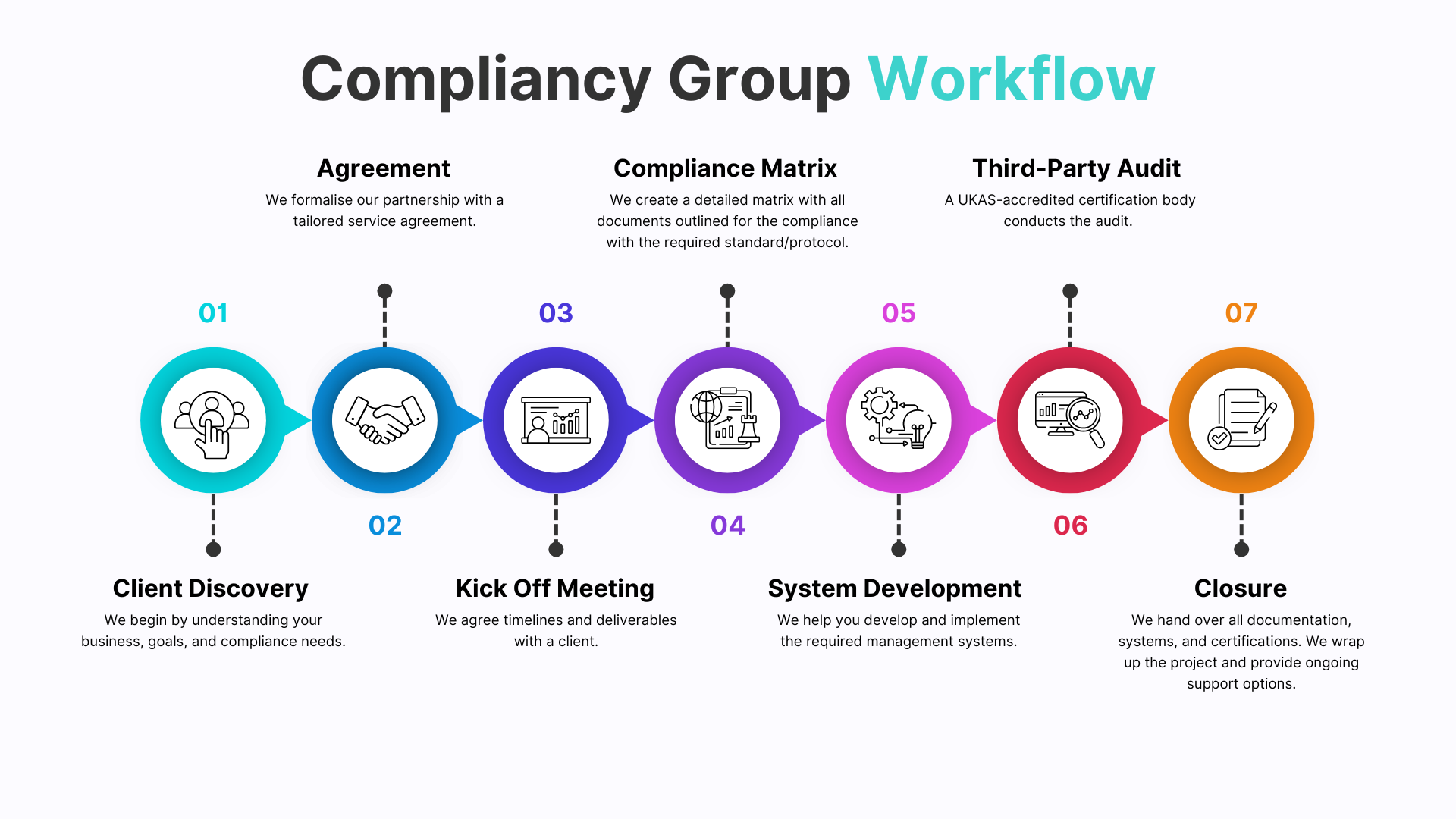We're Here To
Help

FORS (Fleet Operator Recognition Scheme) accreditation is the leading standard for best practice in fleet operations across the UK. Achieving FORS demonstrates your commitment to safety, efficiency, and environmental responsibility in transport and logistics. It’s more than a badge – it shows clients and partners that your fleet meets rigorous requirements for driver training, vehicle safety, and operational performance. Compliancy Group makes FORS compliance simple, guiding you through every step so you can focus on running a safer, smarter fleet.
We understand the unique challenges faced by fleet operators and logistics businesses. Our team brings real-world experience with FORS applications, audits, and transport industry regulations.
No one-size-fits-all here. Whether you need FORS gap analysis, ISO certification, statutory inspections, or day-to-day compliance advice, our services are fully customised to your operations. We offer flexible support packages – from essential guidance to comprehensive on-site consultancy.
We partner exclusively with UKAS-accredited certification bodies and maintain a 100% pass rate for certification assessments. Our clients trust us to deliver results that stand up to audit and regulatory scrutiny – helping you achieve, maintain, and leverage compliance for business growth.
Compliance shouldn’t slow you down. We help you build safer, more resilient operations, reduce risk, and improve efficiency – so you can focus on delivering projects and winning contracts.
You’ll work directly with our expert team, including leadership involvement from our CEO. We pride ourselves on responsive communication, clear guidance, and ongoing support throughout your compliance journey.





FORS accreditation opens doors to contracts with major clients and public sector organisations.
Demonstrate your commitment to safety, efficiency, and sustainability in fleet operations.
Compliance with FORS standards helps prevent costly incidents and operational disruptions.
Achieving and maintaining FORS accreditation enhances your standing in the transport and logistics sector.
Regular audits and compliance checks foster a culture of ongoing improvement and operational excellence.
From gap analysis to audit support, our team ensures you’re always prepared and confident.
We streamline compliance processes, freeing up your team to focus on core business activities.
Services are tailored to your specific business needs, not generic templates.
Ongoing support, training, and regulatory updates keep your business compliant long after certification.
Our 100% certification pass rate and exclusive partnerships with UKAS-accredited bodies mean you’re in safe hands.

FORS (Fleet Operator Recognition Scheme) accreditation is a voluntary scheme for fleet operators in the UK. It aims to raise the level of quality within fleet operations and demonstrate which operators are achieving exemplary levels of best practice in safety, efficiency, and environmental protection.
FORS requirements are comprehensive standards set for fleet operators related to vehicle safety, fuel efficiency, economical operations, and emissions. The specific requirements vary depending on the level of accreditation sought (Bronze, Silver, or Gold), but they broadly encompass areas like management, vehicles, drivers, and operations.
There are three levels of accreditation within FORS: Bronze: This is the entry-level accreditation that confirms an operator adheres to the industry law and regulations and employs best practices. Silver: This is the next level up and requires evidence of efforts to improve driver and vehicle safety, as well as a commitment to reduce the fleet’s environmental impact. Gold: The highest level, Gold accreditation, requires operators to demonstrate consistent best practice and compliance with criteria set for Silver, plus efforts towards improving the industry’s image and making continuous improvements.
A FORS level refers to the specific accreditation tier within the Fleet Operator Recognition Scheme. As mentioned, there are three levels: Bronze, Silver, and Gold, each representing increasing standards of best practice in fleet management.
The benefits of FORS include: Enhanced road safety and reduced accident rates. Improved fuel efficiency leading to cost savings. Reduction in vehicle emissions, contributing to a cleaner environment. Access to training and resources to continually improve operations. Enhanced reputation and increased business opportunities with clients who prioritise safe and sustainable transport.
The main differences between Bronze and Silver FORS are: Bronze: As the entry level, it focuses on ensuring the operator is compliant with industry laws and regulations, demonstrating good practice in areas like vehicle maintenance, driver licencing, and operational efficiency. Silver: Beyond the Bronze requirements, Silver accreditation looks at active efforts to improve safety (e.g., equipping vehicles with cameras and sensors), initiatives to reduce environmental impact (e.g., monitoring fuel consumption), and professional development opportunities for drivers (e.g., eLearning modules). It also demands evidence of successful progression and maintenance of Bronze standards.
Simply contact us for a free consultation or take our compliance quiz to see where you stand and how we can help your business achieve FORS accreditation.
FORS certification opens up new opportunities with major clients, builds trust with partners, improves your safety and efficiency standards, and strengthens your reputation in the transport and logistics sector.